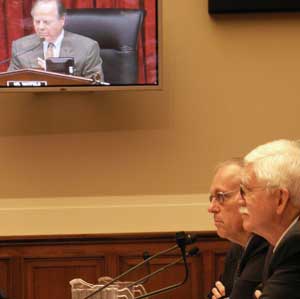|
Feature
CLIMATE: CLIMATE POLICY
Wading Into Heated Politics: Q&A with Gerald North
Plus! The top climate news stories of 2006
 Arguably, one of the biggest climate stories of the year is how the U.S. government has responded to growing public support for mitigating climate change. The U.S. Senate passed a nonbinding resolution recognizing that the climate is warming and that humans are playing a role in it.
Arguably, one of the biggest climate stories of the year is how the U.S. government has responded to growing public support for mitigating climate change. The U.S. Senate passed a nonbinding resolution recognizing that the climate is warming and that humans are playing a role in it.
In July, climatologist Gerald North (foreground) and statistician Edward Wegman testified in front of the House Energy and Commerce Subcommittee on Oversight and Investigations about the famed hockey stick climate analysis. North served on the National Academy of Sciences panel that reviewed the current state of climate change knowledge. Photograph is by Christine McCarty, House Committee on Energy and Commerce.
Several members of the House of Representatives proposed a similar resolution, but it was struck down on a technicality. Meanwhile, the House held several hearings on climate change — specifically, on questioning the merits of the famed “hockey stick” graph, which was published in the seminal 1998 and 1999 papers by Michael Mann, Ray Bradley and Malcolm Hughes, and suggests that the last few decades of the 20th century were warmer than any time during the past millennium (see Geotimes, September 2006).
Congress tasked two separate teams with evaluating the graph and the science that went into it. One team was led by Edward Wegman, a statistician at George Mason University, and looked solely at the statistical methods involved in the hockey stick analysis to determine if the conclusions were well-founded. The team’s results suggested that the assessments that the 1990s was the hottest decade of the millennium “could not be supported.”
The other team was a National Academy of Sciences committee, chaired by Gerald North, distinguished professor of atmospheric sciences and holder of the Harold J. Haynes endowed chair in geosciences at Texas A&M University. Geotimes reporter Megan Sever had a chance to talk with North about his experiences examining the hockey stick report and testifying about climate change before Congress, and about his thoughts on the climate policy debate.
MS: How did you get involved in the “hockey stick” climate change debate?
GN: I’ve been working on climate-related issues for about 35 years — quite a long time. …This past spring, Ralph Cicerone, who is now the president of the National Academy of Sciences, called me and asked if I would chair this committee. Ralph knew that I am well-versed on this subject, and the fact that I was from Texas probably didn’t hurt, given that the president and chairman of the [House Energy and Commerce] committee [Rep. Joe Barton (R)] are from Texas.
So the National Academies staff and I worked together to assemble a committee of 12 scientists from very diverse fields, including tree-ring experts, ice specialists, ancient sediment specialists, a couple of atmospheric scientists, an ocean geochemist and so on. We were to examine this iconic paper that had been waved around like a flag. We were also to examine subsequent research articles by others and place the whole thing into the context of anthropogenic global warming.
MS: Do you think that the hearings and the recent reports have put the hockey stick debate — specifically the question of whether the past few decades were the warmest over the past 1,000 years — to rest?
GN: I do not think the debate will end here because one extreme side thinks the results are so well-established that our committee was not even necessary. Then there are the extreme skeptics who feel that we should fixate on the Mann et al. studies and never move on. They feel, I suppose, that they have found a flaw and that therefore the whole study and its conclusions are incorrect. …
Many in this debate are not after the truth, but they are representing a client, like a lawyer [would]. No matter what the client did, the lawyer has or feels the obligation to do everything in his or her power to present the best possible case for the client. This tactic can be used to delay taking any action that might disadvantage a client in profit or ideological position.
MS: What do you think about how Congress is treating climate change?
GN: I think Congress is coming around. They read the polls, and they know that the majority in the general public now thinks that global warming is happening and thinks that humans are the cause of it. …
Congress is actually looking in the right direction, I think. Barton’s committee, for example, is looking at ways to mitigate global warming without necessarily cutting back the use of fossil fuels. ... It may be politically impossible to do anything about burning coal or oil, so our only real alternative is to find some way to get rid of the carbon dioxide that’s stuck in our atmosphere. I’ll tell you something: As long as there’s a lump of coal or a gallon of oil, we’re going to burn it. You can’t stop people from doing that.
Also, as Barton points out, we have the economy to think about. We shouldn’t shut down the world economy [that is based on fossil fuels], and we also do have some time to act.
MS: How much time do you think we have?
GN: Well, this is one place I disagree slightly with some of my colleagues. My good friend Jim Hansen [a climatologist at NASA Goddard Institute for Space Studies], for example, is a little more concerned. His biggest worry is the sudden collapse of the ice sheets, which makes a lot of sense. … New research is showing that it’s probably not going to be as gradual as people thought five years ago. If the ice sheets suddenly collapse, we’ll see a huge sea-level rise, and we could even see some ocean circulation patterns shut down (see Geotimes, November 2006). …
Still, I think we have a little bit of time before we have to act — not a lot, of course, but maybe 20 years or so. … Whether we burn all of the world’s fossil fuels in the next decade or the next 50 years doesn’t make any difference because it’s the same amount of carbon dioxide going into the atmosphere. The residence time [the time it takes to move through the system] of carbon dioxide in the atmosphere is 200 years. So it seems to me that the answer needs to be more about getting the greenhouse gases out of the atmosphere. …
Now, there are a lot of political reasons to stop being so reliant on foreign oil — national security issues, for one. … But while we may have time before we have to act, we do need to be investing money now.
MS: What specific steps would you recommend to Congress?
GN: We ought to keep funding basic climate research. There’s just so much we don’t understand yet.
First, I’d tell Congress to take a look at the NASA budget. They’re killing science programs left and right in order to explore, to go to the moon and Mars. These are science programs that have been in place for many years and have taught us so much. … So, I’d say step number one is to stop killing science programs in NASA.
Secondly, Congress needs to give money to the Department of Energy to plan new ways to slow down the greenhouse effect — and I think they’re doing this to some extent. … But they shouldn’t be spending a mere $1 billion, they ought to be spending $20 billion on solutions. …
There needs to be an investment plan that ramps up over a decade or so, to a very large amount. I’m not a politician or an economist of course, so I’m speaking as an amateur, but you don’t have to be very smart to realize the implications of cutting basic science programs. A lot that we know about global warming, big ice sheet changes, the sun’s brightness and radiation characteristics and so on is known from NASA satellites … you can watch the NASA programs go down the tubes and know that we’re losing valuable information with them.
MS: What do you think is needed to settle the debate over the hockey stick and its broader climate conclusions?
GN: Frankly, I believe a lot more scientific work needs to be done on this problem, specifically temperature reconstructions, before we can feel completely comfortable about it. No one is really sure about the way large-scale temperature has behaved over the first half of the last thousand years. We need some scientific creativity and hard work. We will not solve the problem by going over the same paper ad nauseam.
But this should not distract us from the facts: that the recent — last 150 years — global warming is well-established and that humans are the cause.
Links:
"Hockey stick climate study faces scrutiny," Geotimes, September 2006
"Conveyor belt shutdown not imminent," Geotimes, November 2006

 Subscribe
Subscribe

